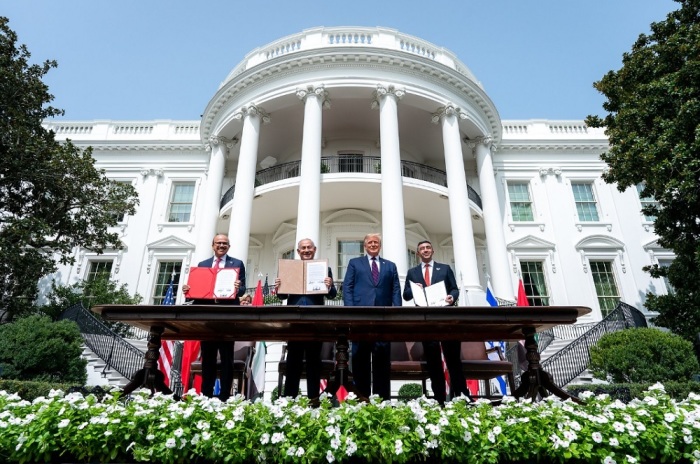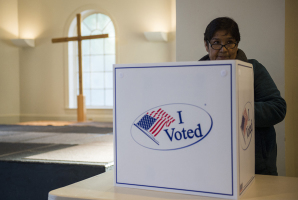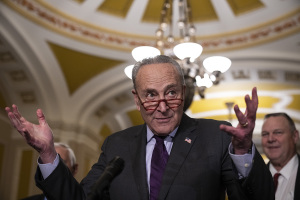The Christian Post's top 10 news stories of 2020 (part 1)

7. Abraham Accords
In moves that defied many years of intellectual consensus and conventional wisdom of the foreign policy establishment in Washington, D.C., the Trump administration brokered several peace deals between Arab-majority countries and Israel.
Thus far in 2020, the United Arab Emirates, the Persian Gulf island archipelago nation of Bahrain, and northern African countries Sudan and Morocco have agreed to normalize diplomatic relations with the Jewish state.
Prior to the Trump administration's efforts, the thinking has been that in order for peace deals to happen between Israel and Arab states in the Middle East and Africa, a workable resolution of the long-running conflict between Israelis and Palestinians must occur first.
Additionally, Serbia and Kosovo — a partially recognized Muslim-majority nation in Eastern Europe — agreed to normalize economic relations between the two countries. As part of the terms, Serbia agreed to recognize Jerusalem as Israel's capital and relocate its embassy there in July 2021. The United States recognized Jerusalem as Israel's capital in late 2017 and moved its embassy there the following year.
The peace deals with the UAE and Bahrain were signed on Sept. 15 in a joint ceremony at the White House and were called the Abraham Accords, given that Arabs and Jews "are descendants of a common ancestor, Abraham, and inspired, in that spirit, to foster in the Middle East a reality in which Muslims, Jews, Christians and people of all faiths, denominations, beliefs and nationalities live in, and are committed to, a spirit of coexistence, mutual understanding and mutual respect."
The accords further hold that the nations will agree to cooperate across several areas, normalizing relations in many economic sectors and cultural spheres, among them tourism, energy, agriculture, and maritime arrangements.
The UAE announced that it would normalize full relations with Israel in August and within a month, on the 19th anniversary of the 9/11 terrorist attacks, Bahrain announced that it, too, would normalize relations.
In exchange for full diplomatic relations with the UAE, Israel agreed to freeze its decision to annex some Palestinian territories, a condition the UAE saw as vital, though one Israeli official said the suspension was temporary in view of the deal's signing.
The deal includes a $23 billion arms sale to the UAE after reestablishing ties, an item some Democratic legislators are presently attempting to block.
The successive deals with the two nations were made approximately 26 years after the last time an Arab state made peace with Israel when Jordan signed a peace treaty in 1994.
In October, Sudan became the third majority-Arab nation to establish full relations with Israel. That Sudan agreed to do so was seen as especially significant given that its capital city, Khartoum, was the site of the 1967 Arab League summit in which eight Arab nation-states approved the Khartoum Resolution. That resolution contained what would become known as the 'Three nos' — no peace, no negotiations, and no recognition of Israel.
Yet the agreement might now be unraveling as recent reports suggest Sudan is beginning to back away from its promise.
Last week, the northwestern African nation of Morocco agreed to normalize relations with Israel in an agreement where the U.S. recognized their claims of sovereignty over Western Sahara, a disputed territory to their south.
Spain once occupied Western Sahara but withdrew in 1976 and Morocco summarily annexed the northern two-thirds. In 1979, Morocco claimed the rest of the contested land. The land is on the United Nations' list of non-self-governing territories though Morocco has been occupying approximately 80% of the territory and the self-proclaimed Sahrawi Arab Democratic Republic controls the remaining 20%.
Trump noted in a Dec. 10 tweet that it was "fitting" that the United States recognize Moroccan sovereignty over Western Sahara as Morocco recognized the U.S. in the year 1777.
Although some hailed the move as a positive development in that another nation has been added to the list of countries that have made peace with Israel, the agreement is presently facing bipartisan pushback due to the provisions surrounding Moroccan sovereignty over the contested land.
“I am saddened that the rights of the Western Saharan people have been traded away,” said Sen, Jim Inhofe, R-Okla., the chairman of the Senate's Armed Services Committee, who is usually allied with the president, according to The Hill.
Inhofe called Morocco's claim to Western Sahara "shocking and deeply disappointing."
Similarly, House Foreign Affairs Committee Chairman Eliot Engel, D-N.Y., said Thursday that he was "concerned this announcement upends a credible, internationally supported U.N. process to address the territorial dispute over Western Sahara.”
Yet Jared Kushner, the president's son-in-law and a White House adviser, who has been a key figure in brokering the Middle East deals, called the recognition of Moroccan claims an "inevitability."
“This is an issue that's been out there for a long time, and, quite frankly, there's just been no progress on a resolution,” he told reporters on Thursday.
The series of peace deals indicate a geopolitical shift as predominantly Sunni Muslim Arab nations pivot away from Iran, whose government, comprised of Shi'ite mullahs, is arguably the most openly hostile regime toward Israel in the world. Iran has long been regarded as the chief state sponsor of terrorism in the world and has for many years funded proxies throughout the region such as the terrorist group Hezbollah.
Critics of the accords maintain that the nations that struck deals with Israel were never at war with the Jewish state and that the significance of the agreements is minimal. Top Palestinian officials have spurned the deals saying they amount to "a stable in the back of the Palestinian cause" and "a betrayal."
After the Arab League refused to condemn the normalization agreement between Israel and the UAE, Mohannad Aklouk, the Palestinian envoy to the Arab League, said in a Facebook post: “With pride ... [Palestine] wanted a decision from the Council of Arab Foreign Ministers rejecting and condemning Emirati normalization [with Israel] ... but [Palestine] could not impose it ... We have honor, we have martyrs, we have prisoners, we have the camps of glory. ... And this is enough for us.”
Brandon Showalter contributed to this report




























